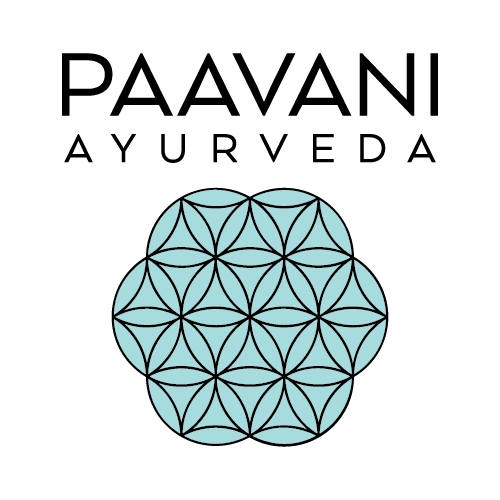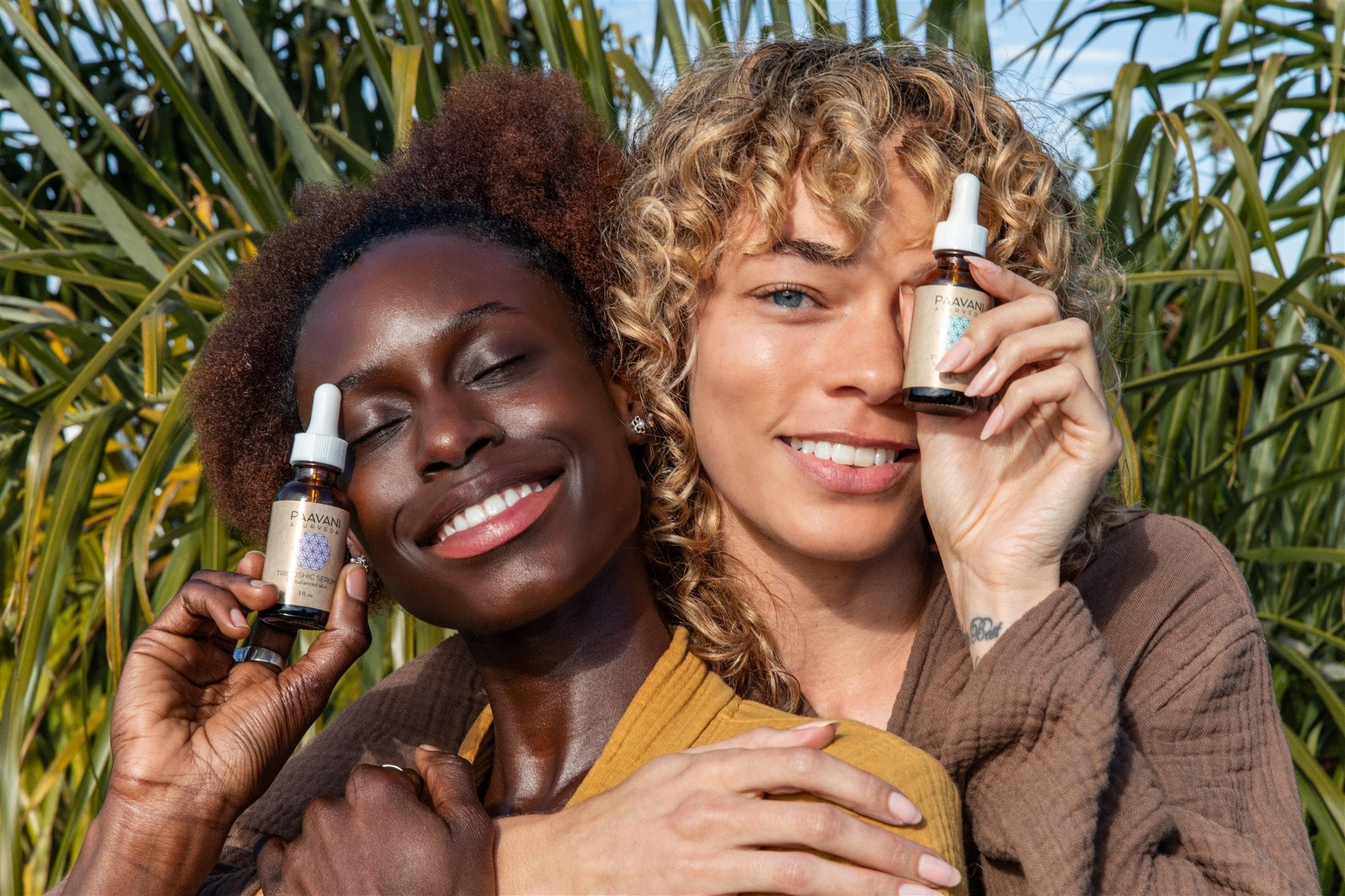
Rasasara Begins with Rasa Dhatu: The Ayurvedic Connection Between Hydration & Skin Health
Glowing, hydrated skin is something we all desire, yet no matter what the media tells you, lasting radiance is never found in surface treatments alone. According to Ayurveda, true skin health begins deep within the body’s tissues. At the root is rasa dhatu—plasma and lymph, the waters of the body, that nourish every cell and provide the foundation for vibrant health. When rasa dhatu is abundant and balanced, the skin naturally shines with rasasara, Ayurveda’s term for healthy, radiant, well-hydrated skin.
In this blog, we will explore the Ayurvedic connection between rasa dhatu and skin health, touch on the role of the seven dhatus, and share practical ways you can build and preserve healthy rasa for a lasting glow through Ayurvedic skincare rituals.
The Seven Dhatus in Ayurveda
In Ayurveda, the body is sustained by seven dhatus—the fundamental tissues that uphold health and vitality. These tissues form in a specific sequence, with each one nourishing the next, beginning with plasma (rasa) and culminating in reproductive tissue (shukra/artava).
Because it is the first to form, rasa dhatu provides the foundation for all other tissues. When rasa is healthy, every subsequent tissue is nourished. When rasa is depleted, imbalance can cascade throughout the body.
This is why Ayurveda emphasizes the importance of caring for rasa dhatu—not only for overall health, but also for the radiance of your skin.
Rasa Dhatu: The Foundation of Skin Health
Rasa translates as “essence, juice, fluid” while dhatu means “that which upholds the body.” Together, rasa dhatu is the body’s plasma and lymph—the fluid essence that carries nutrition to every cell.
When rasa dhatu is abundant and flowing, your skin reflects it: soft, supple, hydrated and glowing. When it is depleted, skin becomes dry, wrinkled or dull, and immunity, mood and reproductive health may also decline.
This is why Ayurveda says: healthy rasa dhatu = healthy skin.
Rasasara: Radiance That Reflects Healthy Rasa
The outward reflection of balanced rasa dhatu is known in Ayurveda as rasasara. More than surface beauty, rasasara is the glow that arises when your body’s first tissue is nourished, hydrated and in harmony.
Rasasara is skin that is naturally radiant, soft and resilient. It is a visual indicator that rasa dhatu is abundant and your body’s tissues are thriving. Unlike Western skincare, which often treats dryness only on the surface with serums and creams, Ayurveda teaches that hydration begins within.
Rasa dhatu is your body’s internal hydration system. When it is strong, it nourishes the skin the way water sustains a plant. Without healthy rasa dhatu, even the most advanced topical treatments cannot create lasting radiance. True glow, or rasasara, begins with the fluids that sustain life itself.

Rasa & the Doshas
Although rasa dhatu imbalance can occur with all doshas, vata has the most immediate impact on rasa due to its inherently dry, light and mobile qualities. When vata is high, rasa is the first tissue to feel depleted, leading to dryness in the skin, nervous system and emotions. Ayurveda teaches that when the subtle qualities of air and ether (vata dosha) rise in excess, they disturb rasa—drying up its nourishing essence and leaving the body and skin depleted.
This is why Ayurveda emphasizes nourishing rasa most during vata season (autumn through early winter), when the environment reflects the qualities of vata—dry, cold, light and mobile—and hydration and stability are especially needed.
When rasa is depleted, the first signs often appear on the skin as dryness, dullness and premature aging, but the effects ripple deeper, impacting immunity, mood and the proper formation of other bodily tissues. To build and protect healthy rasa dhatu, it is essential to pacify excess vata by inviting warming, grounding, moisturizing and stabilizing qualities into daily life through vata-balancing food, lifestyle and Ayurvedic ritual.
That said, all three doshas influence rasa in unique ways:
Excess vata → depletes rasa, leading to rough, dry skin and lack of luster
Excess pitta → overheats rasa, creating redness, sensitivity or breakouts
Excess kapha → stagnates rasa, resulting in puffiness, congestion or oiliness
When rasa dhatu is balanced—no matter your constitution—the skin reflects it with rasasara: clear, supple, hydrated and radiant.
How to Build Healthy Rasa Dhatu (& Achieve Rasasara)
1. Prioritize Daily Hydration
Warm or room-temperature water keeps rasa dhatu strong and vata balance in check. Instead of chugging, sip steadily throughout the day. Morning hydration is especially vital to cleanse the system and prepare tissues for nourishment.
Try this: Begin each day with a glass of warm lemon water and follow with PAAVANI Hydrate Blend Tea, a demulcent, adaptogenic formula that replenishes rasa dhatu, balances vata and supports glowing skin.

2. Favor Rasa-Building Foods
Ayurveda recommends juicy, hydrating foods to nourish rasa. Think:
Fresh fruits like oranges, melons, peaches & berries
Cooked vegetables like zucchini, cucumber, squash & leafy greens
Grains like rice & oats
Organic whole milk or almond milk spiced with cardamom or turmeric
Ghee and healthy oils to lubricate tissues
Limit dry, processed or overly salty foods, which drain rasa dhatu and disrupt balance.
3. Abhyanga: Self-Oil Massage
Daily self-massage with warm herbal oil (self-abhyanga) strengthens rasa dhatu from the outside in. Abhyanga nourishes skin, calms vata, supports circulation and locks in hydration.
Ritual: Warm herbal-infused PAAVANI Body Oil and massage head to toe before bathing. Over time, this practice supports rasa dhatu and brings rasasara to the surface.

4. Support Agni, the Digestive Fire
Since rasa dhatu forms immediately after digestion, weak agni (digestive fire) means weak rasa. Build strong digestion by:
Tongue scraping upon waking
Eating at consistent times
Favoring freshly cooked, warm meals
Avoiding overeating or skipping meals
Drinking digestive churnas with meals
Cooking with spices like cumin, ginger & fennel
Tip: Sip a dosha-specific PAAVANI Spice Blend churna or Triphala churna in the evening to keep digestion strong and rasa dhatu nourished. We especially love our Vata Spice Blend when working to heal rasa dhatu, as it contains licorice—a classic Ayurvedic skincare herb that builds healthy rasa.
5. Manage Stress to Protect Rasa
Stress is one of the quickest drains on rasa dhatu and increases vata dosha. Dry mouth, dehydration and fatigue are common signs. Pranayama (breathwork), meditation, yoga and time in nature preserve rasa, nourish vata and keep skin luminous. Even short breaks from screens protect subtle fluids and skin clarity.
6. Demulcent Herbs for Rasa Dhatu & Skin Health
Demulcent herbs are a cornerstone for building rasa dhatu and hydrating vata dosha. Their mucilaginous properties coat, hydrate and soothe tissues, protecting rasa at its root.
Key Ayurvedic demulcents include:
Shatavari – rasa-building & supportive for women’s cycles
Licorice – lubricates tissues & keeps skin soft
Marshmallow root – hydrates the gut lining for better nutrient absorption
Indian Sarsaparilla – cooling, hydrating & blood-purifying; deeply supports the skin while soothing dryness & excess heat in rasa dhatu
Enjoy these herbs as powders in warm milk or as loose-leaf teas, like PAAVANI Hydrate Blend Tea, which delivers demulcent hydration for both rasa dhatu, vata balance and Ayurvedic skincare glow.
7. Rest & Restore
Sleep is rasa’s most natural replenisher. Ayurveda recommends sleeping between 10pm–6am for optimal tissue repair and hydration.
Create a calming evening ritual: dim the lights, oil the feet and sip PAAVANI Golden Milk to preserve rasa, ground vata and enhance rasasara.

Additional Rasa-Building Practices
Aromatic Spices & Rasayana Herbs – Tulsi, amalaki and ashwagandha rejuvenate rasa while calming stress. Cooling spices like coriander, fennel and rose balance hydration.
Nasya (Nasal Oil Therapy) – A few drops of PAAVANI Nose Oil each morning hydrate delicate mucous membranes and support rasa dhatu.
Eye Care Rituals – Rasa dhatu supports the sensory organs. Using the PAAVANI Eye Wash Ritual soothes dryness, relieves strain and preserves inner fluids.
Emotional Nourishment – Since rasa also means “essence of experience,” joy, art, intimacy and laughter all build rasa. Emotional balance translates into glowing, hydrated skin.
Signs of Healthy Rasa Dhatu (& True Rasasara)
✔️ Skin that is plump, soft and hydrated
✔️ Bright eyes & lustrous hair
✔️ Steady emotions & compassion
✔️ Strong immunity & steady energy
✔️ Healthy cycles for women
✔️ A radiant glow that shines without effort
Why Nourishing Rasa Dhatu Matters
Rasa dhatu is more than the foundation of skin health—it is the foundation of life itself. When it flows freely, every tissue in the body receives nourishment, the mind feels calm and steady, and the skin becomes a natural reflection of inner vitality.
When it is depleted, vata dosha rises in excess and imbalance spreads through the system, showing up not only as dull, dry skin but also as fatigue, low immunity and emotional fragility.
By caring for rasa through hydration, nourishing foods, demulcent herbs and restorative rituals, you are doing more than enhancing your glow—you are strengthening the very essence that sustains health, beauty and resilience. In Ayurveda, this is the secret to radiance that lasts: build rasa, and you build the foundation for a luminous body, mind and spirit.
Ayurvedic Skincare
✨ Ancient Ayurveda for the Modern World ✨








Leave a comment
This site is protected by hCaptcha and the hCaptcha Privacy Policy and Terms of Service apply.